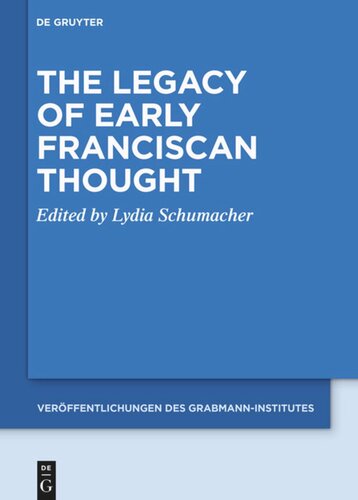

Most ebook files are in PDF format, so you can easily read them using various software such as Foxit Reader or directly on the Google Chrome browser.
Some ebook files are released by publishers in other formats such as .awz, .mobi, .epub, .fb2, etc. You may need to install specific software to read these formats on mobile/PC, such as Calibre.
Please read the tutorial at this link: https://ebookbell.com/faq
We offer FREE conversion to the popular formats you request; however, this may take some time. Therefore, right after payment, please email us, and we will try to provide the service as quickly as possible.
For some exceptional file formats or broken links (if any), please refrain from opening any disputes. Instead, email us first, and we will try to assist within a maximum of 6 hours.
EbookBell Team

4.0
56 reviewsOpen Access
The legacy of late medieval Franciscan thought is uncontested: for generations, the influence of late-13th and 14th century Franciscans on the development of modern thought has been celebrated by some and loathed by others. However, the legacy of early Franciscan thought, as it developed in the first generation of Franciscan thinkers who worked at the recently-founded University of Paris in the first half of the 13th century, is a virtually foreign concept in the relevant scholarship. The reason for this is that early Franciscans are widely regarded as mere codifiers and perpetrators of the earlier medieval, largely Augustinian, tradition, from which later Franciscans supposedly departed. In this study, leading scholars of both periods in the Franciscan intellectual tradition join forces to highlight the continuity between early and late Franciscan thinkers which is often overlooked by those who emphasize their discrepancies in terms of methodology and sources. At the same time, the contributors seek to paint a more nuanced picture of the tradition’s legacy to Western thought, highlighting aspects of it that were passed down for generations to follow as well as the extremely different contexts and ends for which originally Franciscan ideas came to be employed in later medieval and modern thought.